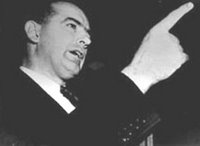Have we really changed that much in the five years since 767s became missiles to be used against our skyscrapers? Americans are more suspicious of their neighbors and have lost a few rights in the name of liberty, but this is nothing new. It happened during the Red Scares of the 1920s and the 1950s. And in 1919-20, there were a lot more bombings then there have been since 2001-2006 (yet obviously with much less loss of life).
 Senator McCarthy had everyone looking under the bed for Commies in the 1950s; there were blacklists, arrests subpoenas, firings, etc. As for the economy, NY Times columnist and economist Paul Krugman has said that we've been in the middle of a jobless recovery. I think it's safe to say that with high oil prices left over from last year's hurricane season and saber rattling with Iran that threatens more inflation, another recession might be on the horizon. But again, this economic slowdown is nothing new for the American people. We're not sailing on uncharted waters here. Oil prices shot up after Iraq's invasion of Kuwait in the summer of 1990 helping trigger a recession, and previously, America's support of Israel in the Yom Kippur War in 1973 led to an embargo (and rising oil prices) in the mid 70s which led to scary inflationary times. There was a recession from 1979-82. Both recessions also had a slow recovery time also. So, we've been down this road before.
Senator McCarthy had everyone looking under the bed for Commies in the 1950s; there were blacklists, arrests subpoenas, firings, etc. As for the economy, NY Times columnist and economist Paul Krugman has said that we've been in the middle of a jobless recovery. I think it's safe to say that with high oil prices left over from last year's hurricane season and saber rattling with Iran that threatens more inflation, another recession might be on the horizon. But again, this economic slowdown is nothing new for the American people. We're not sailing on uncharted waters here. Oil prices shot up after Iraq's invasion of Kuwait in the summer of 1990 helping trigger a recession, and previously, America's support of Israel in the Yom Kippur War in 1973 led to an embargo (and rising oil prices) in the mid 70s which led to scary inflationary times. There was a recession from 1979-82. Both recessions also had a slow recovery time also. So, we've been down this road before.Unfortunately, we've also been in the heavily traveled freeway of continuous war before. The war on terrorism and the Cold War can be seen as similar, but I surely hope it doesn't take 45 years to eradicate global terrorism. Along the way in the Cold War, there were less than decisive victories and losses - Korea and Vietnam come to mind. In the war on terror (WOT), uh... Afghanistan and Iraq come to mind. Afghanistan is a victory in some folks' minds b/c we knocked the Taliban from power and installed someone (Hamid Karzai) who's friendly to us. Unfortunately, the Taliban are still tooling around the country and making life miserable for the Afghanis. Iraq's evil dictator Saddam Hussein fell w/in 3 weeks despite warnings of American soldiers being gassed by Chemical Ali once they crossed the red ring (on defense planners' maps) around Baghdad.
 It took another nine months to find Hussein and thankfully he'll die for his crimes at the hands of the Iraqi people and not us. Iraq and Vietnam are similar in many ways, but one way they are NOT similar is in the death toll of American soldiers. I don't know if we're tough enough to take the death toll that Americans endured during Vietnam when sometimes a thousand soldiers died in one week. We are currently around 2,600 Americans dead in Iraq and over 15,000 wounded since March 2003. I mean, Americans (and the dovish Clinton administration) freaked out when they saw pictures of some of the 19 dead elite American soldiers paraded through the city of Mogadishu, Somalia in October 1993. After that, we promptly fled the country. Even the icon of Republican moxy and toughness, Ronald Reagan, cut and ran in 1983 when 241 soldiers were killed in a horrific truck bombing. And, the worst and probably least known part about this whole thing is that a retaliation was called off at the last minute b/c it might damage relations with other Arab nations. I have to hand it to the cowboy from Crawford, Texas: he has stayed put come hell or high water.
It took another nine months to find Hussein and thankfully he'll die for his crimes at the hands of the Iraqi people and not us. Iraq and Vietnam are similar in many ways, but one way they are NOT similar is in the death toll of American soldiers. I don't know if we're tough enough to take the death toll that Americans endured during Vietnam when sometimes a thousand soldiers died in one week. We are currently around 2,600 Americans dead in Iraq and over 15,000 wounded since March 2003. I mean, Americans (and the dovish Clinton administration) freaked out when they saw pictures of some of the 19 dead elite American soldiers paraded through the city of Mogadishu, Somalia in October 1993. After that, we promptly fled the country. Even the icon of Republican moxy and toughness, Ronald Reagan, cut and ran in 1983 when 241 soldiers were killed in a horrific truck bombing. And, the worst and probably least known part about this whole thing is that a retaliation was called off at the last minute b/c it might damage relations with other Arab nations. I have to hand it to the cowboy from Crawford, Texas: he has stayed put come hell or high water.Another thing that is similar to events in the past is the threat of instant annihilation, but instead this time the t
 hreat isn't necessarily nuclear missiles from the sky. I had my nuclear awakening when I was in my early teens when I got a double whammy of Mad Max: The Road Warrior (1981) and The Day After (1983). The latter especially scared the daylights out of me. A 1982 survey found that fear of a nuclear holocaust was the "#1 concern for teenage boys and #2 among girls" (Holtz). Fear of an unwinnable nuclear winter was many a teenager's mind back then. But since the end of the Cold War and the advent of the WOT, now we can die in so many random ways: chemical gas attack in subways; bio attack in our water, air or food; small nuke smuggled in through our porous borders; dirty bombs; suicide attacks; random coordinated attacks like the ones in London last summer and the one in Madrid. There are so many ways we can die that duct tape and plastic sheeting won't save us.
hreat isn't necessarily nuclear missiles from the sky. I had my nuclear awakening when I was in my early teens when I got a double whammy of Mad Max: The Road Warrior (1981) and The Day After (1983). The latter especially scared the daylights out of me. A 1982 survey found that fear of a nuclear holocaust was the "#1 concern for teenage boys and #2 among girls" (Holtz). Fear of an unwinnable nuclear winter was many a teenager's mind back then. But since the end of the Cold War and the advent of the WOT, now we can die in so many random ways: chemical gas attack in subways; bio attack in our water, air or food; small nuke smuggled in through our porous borders; dirty bombs; suicide attacks; random coordinated attacks like the ones in London last summer and the one in Madrid. There are so many ways we can die that duct tape and plastic sheeting won't save us.You'll hear more and more people say that we're in a new era. Yeah, terrorists now use computers to try and kill us instead of land line phones or mail bombs like they did in 1919 (or in Ted Kaczynski's case, as late as 1995). It's a frightening world out there. But, if you really think about it, it's always been a frightening world.
Holtz, Geoffrey T. Welcome to the Jungle: the Why Behind Generation X. New York: St. Martin's Griffin, 1995. 1-289. ISBN 0312132107



No comments:
Post a Comment